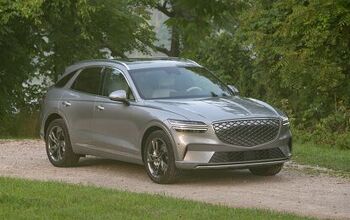Japan Says There's Nothing Closed About Its Barrier-filled Automotive Market

Japan has, once again, scoffed at U.S. demands for better access to its car market on Friday, setting the tone for next month’s unproductive talks on bilateral trade and economic relations between the two countries. U.S. Vice President Mike Pence and Japanese Deputy Prime Minister Taro Aso are supposed to hash things out in April but, before they’ve even managed to exchange pleasantries, the table is being set for failure.
If you’re wondering who is to blame, there are plenty of places to point the finger. The U.S. government complained to the World Trade Organization on Wednesday, claiming there are “a variety of non-tariff barriers [that] impede access to Japan’s automotive market.”
Today, Japan’s Chief Cabinet Secretary, Yoshihide Suga, offered his rebuttal to reporters. “We do not impose import tariffs on cars, and we do not impose any non-tariff barriers,” he said.
Deciphering which country is slinging lies is a waste of time, as both are technically correct in their statements. While Japan does not impose import tariffs on American automobiles, but they’ve also routinely failed to sell any at a meaningful volume. A large part of that has to do with the overwhelming prejudice against U.S. cars within the country. What cars do make it are part of a niche market that is so small, it’s almost not worth mentioning. American cars only made up 0.3 percent of the Japanese market in 2016 and those that do make it to the islands end up stickering for nearly double the domestic price.
Any automaker wanting to sell at volume would be forced to invest heavily into Japan’s costly real estate, build an extensive dealer network, select models suitable for the market, and then spend a fortune on a massive PR campaign to change the perceptions of a consumer base that had already made up its mind. It’s a massive expenditure what would still result in a big gamble. However, that gamble would be tariff free.
“Our position is that Japan’s auto market is already open. This is something that will be settled in our bilateral dialogue,” claimed Suga.
It might not even be worth debating the matter, as we know Japan isn’t interested in offering a handout or even a leg up to foreign manufacturers — even highly desirable German cars just barely get in. However the Trump administration has indicated a strong interest in supporting U.S. automakers and has already been critical of the Japanese government for sending so much product to North America while accepting so little in return.
Lines are being drawn in the sand, and you just have to wonder why. Especially when China is right there, much larger, and open for business.
[Source: Reuters]

A staunch consumer advocate tracking industry trends and regulation. Before joining TTAC, Matt spent a decade working for marketing and research firms based in NYC. Clients included several of the world’s largest automakers, global tire brands, and aftermarket part suppliers. Dissatisfied with the corporate world and resentful of having to wear suits everyday, he pivoted to writing about cars. Since then, that man has become an ardent supporter of the right-to-repair movement, been interviewed on the auto industry by national radio broadcasts, driven more rental cars than anyone ever should, participated in amateur rallying events, and received the requisite minimum training as sanctioned by the SCCA. Handy with a wrench, Matt grew up surrounded by Detroit auto workers and managed to get a pizza delivery job before he was legally eligible. He later found himself driving box trucks through Manhattan, guaranteeing future sympathy for actual truckers. He continues to conduct research pertaining to the automotive sector as an independent contractor and has since moved back to his native Michigan, closer to where the cars are born. A contrarian, Matt claims to prefer understeer — stating that front and all-wheel drive vehicles cater best to his driving style.
More by Matt Posky
Latest Car Reviews
Read moreLatest Product Reviews
Read moreRecent Comments
- Jalop1991 take longer than expected.Uh-huh. Gotcha. Next step: acknowledging that the fantasies of 2020 were indeed fantasies, and "longer than expected" is 2024 code word for "not gonna happen at all".But we can't actually say that, right? It's like COVID. You remember that, don't you? That thing that was going to kill the entire planet unless you all were good little boys and girls and strapped yourself into your living room and never left, just like the government told you to do. That thing you're now completely ignoring, and will now deny publicly that you ever agreed with the government about.Take your "EV-only as of 2025" cards from 2020 and put them in the same file with your COVID shot cards.
- Jalop1991 Every state. - Alex Roy
- CanadaCraig My 2006 300C SRT8 weighs 4,100 lbs. The all-new 2024 Dodge Charge EV weighs 5,800 lbs. Would it not be fair to assume that in an accident the vehicles these new Chargers hit will suffer more damage? And perhaps kill more people?
- Akila Hello Everyone, I found your blog very informative. If you want to know more about [url=
- Michael Gallagher I agree to a certain extent but I go back to the car SUV transition. People began to buy SUVs because they were supposedly safer because of their larger size when pitted against a regular car. As more SUVs crowded the road that safety advantage began to dwindle as it became more likely to hit an equally sized SUV. Now there is no safety advantage at all.


































Comments
Join the conversation
Shouldn't building a more competitive and higher quality product apply to all markets and not just the Japanese? The quality of American brand vehicles has improved drastically over what it was 20 or more years ago. Could it still improve? Yes but give credit where credit is due. Look at the Mustang, the full size American trucks, and cars like the Chevy Impala which are drastically better than they were even a few years ago. The problem with Japan is that they have an aging population with not a lot of potential for large growth. Also the US does not make Kei cars and most of the compact and subcompact cars that US manufacturers make are based on European or South Korean cars with many even being made overseas and designed overseas. Most of our US base cars and trucks are too big for Japanese roads. Yes it is possible to be more competitive in Japan but is it worth the expense and could the resources be better utilized in China, India, and other Asian countries with younger populations and more potential for growth? Quality alone will not get you there but you need quality to get customer loyalty and repeat business.
"Tax structure". It's not realistic to expect other countries to widen the roads or cut their fuel taxes to accommodate our large, profligate trucks. On the other hand, like Harley Davidson motorcycles, there are quite a few Asians who would be happy to buy a Firebird or a Mustang or a Cadillac or Lincoln. So when our ostensible "allies" tax laws are clever enough to punitively tax vehicles over 2 liters displacement, that effectively shuts out US-based carmakers. Or when there is a tax on cars that over over 70 inches wide. If they want to do that, fine. Then the US govt should find clever ways of keeping out THEIR products. How about a safety tax on vehicles weighing less than 3,500 lbs?